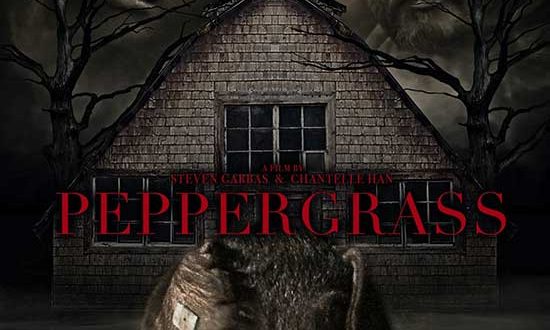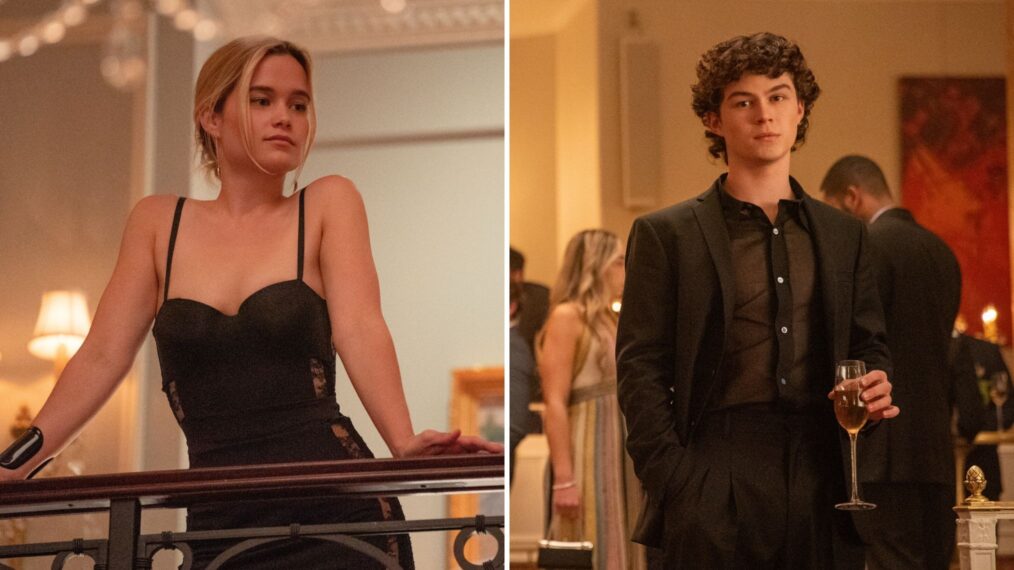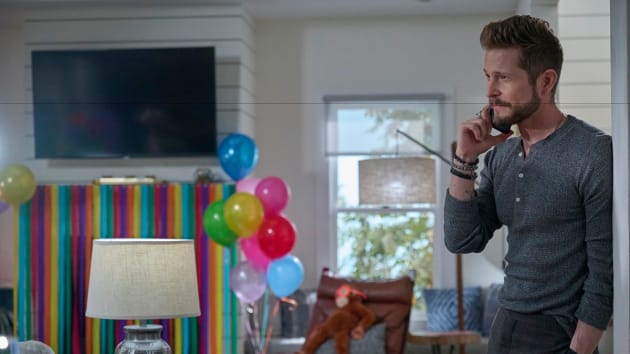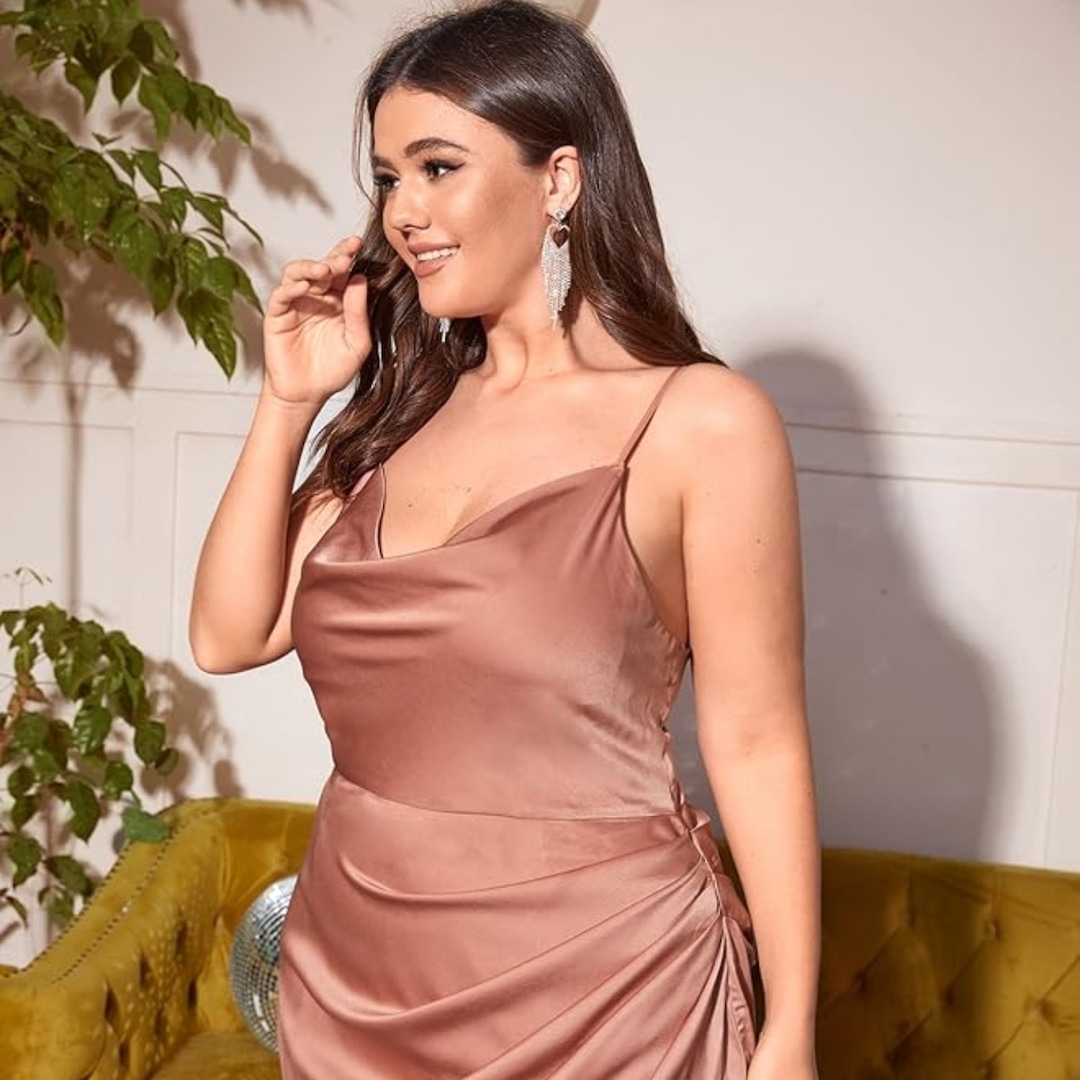Morfydd Clark and Ismael Cruz Córdova spent months auditioning for Prime Video‘s fantasy epic The Lord of the Rings: The Rings of Power. Due to the lengthy pre-production and filming process, it was another year before they actually filmed those scenes. While the wait was painstaking, the time between booking the roles and that first slate was a liberating character development process for both of the stars — and as shown in Season 1, stars, they are.
There was already character detail for Galadriel and Arondir on the page, but transforming the powerful Elf from the supporting character we know her as to the central heart of The Rings of Power required considerable creative effort on Clark’s part. The same goes for Córdova, whose character was among the new ones made specifically for this series. In a joint interview with TV Insider, Clark and Córdova shared how they took Galadriel and Arondir — two Elves of different rank but with a shared sense of righteous defiance — from the page to the screen.
Clark’s audition scene was pulled from Episode 1, the scene with Robert Aramayo‘s Elrond in front of the tapestry. Córdova’s was the scene in which he tells Nazanin Boniadi‘s Bronwyn that he has shown his love “a hundred times over, in every way but words.” Clark didn’t know she was auditioning for Galadriel at the time, and, despite booking the role and going through eight months of production, she felt her audition wasn’t over until that scene was finally filmed. (The onset of the COVID-19 pandemic caused her to wait even longer to get it done.)
“When I actually did it, it was kind of like, ‘Ah! Finished auditioning. It’s done,’” she said, cheekily referencing one of the most recognizable scenes in The Return of the King. The next reference felt unintentional. “It felt really precious.”
Here, learn more about how The Rings of Power‘s warrior Elves came to be.
What was it like to finally film your audition scenes?
Morfydd Clark: I love that I auditioned with [the tapestry] scene actually, because it gives a lot of her story and that she is carrying the weight of history and mistakes and grief with her — the other side of the coin of being immortal. That was my first one. And then I had lots of screen tests with Charlie [Vickers], which was funny. [Director J.A. Bayona] got us to do just wild, crazy things. Made Charlie play guitar a lot, maybe just to make us think he wasn’t who he was.
Ismael Cruz Córdova: I was doing [the above scene with Bronwyn]. And at some point, I started auditioning with the scene in the trenches. There’s an encampment, it’s essentially my fault that we’re there, and I have to cut down the tree. I was working with those two scenes for about seven months, all across the globe as I was working and auditioning for this.
I shot [my audition scenes] a year and five months after I first auditioned for it. It felt completely wrong. I had been sitting with it for so long that I could’ve done 47 takes. But the release was magical. When I did it, I felt like I had arrived finally. I could start being free and creating Arondir.
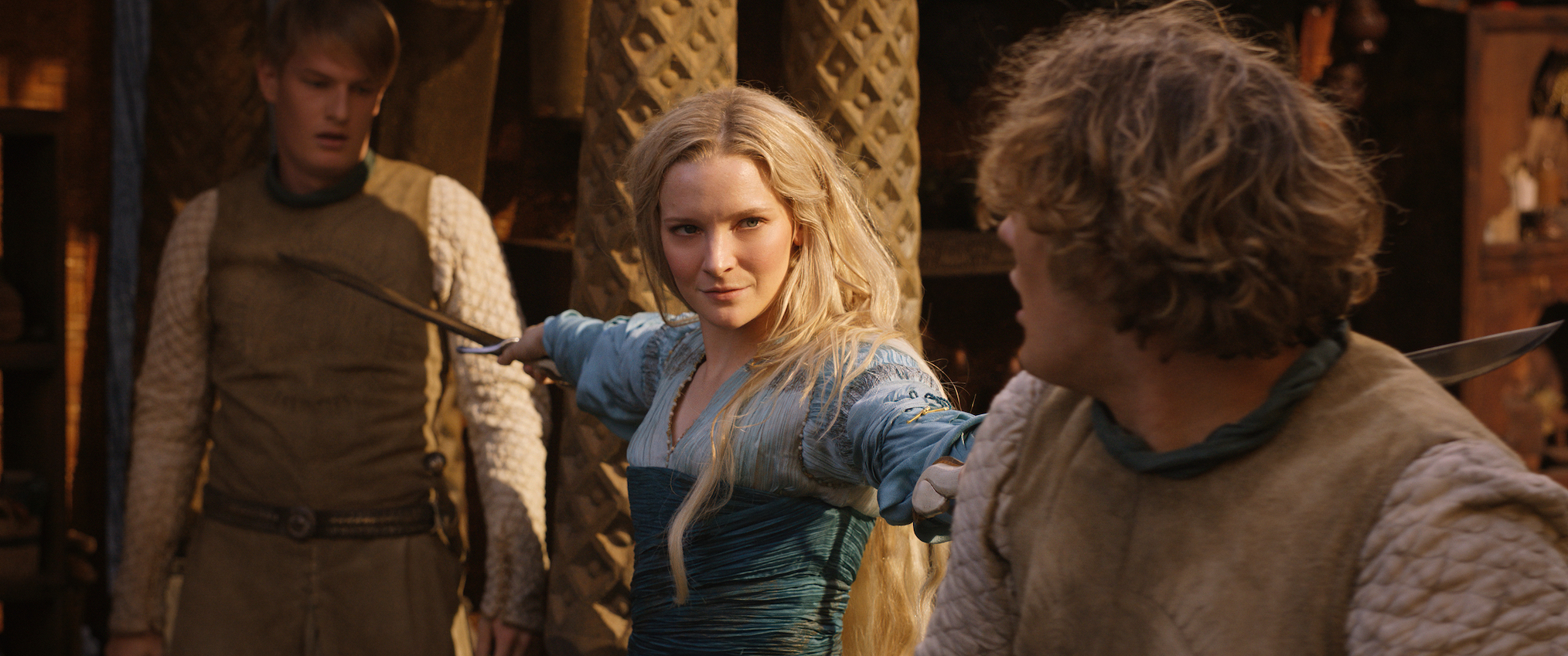
Prime Video
Both of your stunts this whole season were so fresh. Are there any particular stunts that stand out to you?
Clark: We had a wonderful stunt team. They believed in us to do a lot, and then we had wonderful stunters to elevate us. I ended up doing the market scene fight in Númenor, which was so much fun. It was really useful in terms of controlled power for me. Every stunt I got to do, I was just amazed. I’ve loved playing these roles, but I’ve often been killed and attacked, and so I was good at dying and falling to the ground in a flop. To feel powerful and to be able to be the aggressor was very liberating.
Córdova: I loved doing every single stunt that I did. It was a huge part of why I wanted the job and what I wanted to portray and a big part of what I wanted to represent on screen. I came with a very clear idea and proposal for what I wanted to portray on screen, and a big part that I cannot detach from my character is the aspect of representation and what that character was going to say just by virtue of me being an Elf.
Every movement, I wanted to give it a background of different types of classic, in terms of culture that we hadn’t seen before. What is my classic? What is my contribution? What can make this richer with where I come from, which is the first time we see someone that is not white doing an Elven creature?
And so I wanted to treat the stunts like dance, like movement. I wanted to score them with ups and downs, and slows and crescendos, and staccatos and climactic moments. [I] truly, truly obsessed over it and scored it. I was given the opportunity to create the movement mythology for the Southern Elves, so all that you see there is original that we essentially made in the lab with Taekwondo, Wushu, Kung Fu, and all brought together with Capoeira with our incredible family of stunts in New Zealand, that were just the biggest supporters.
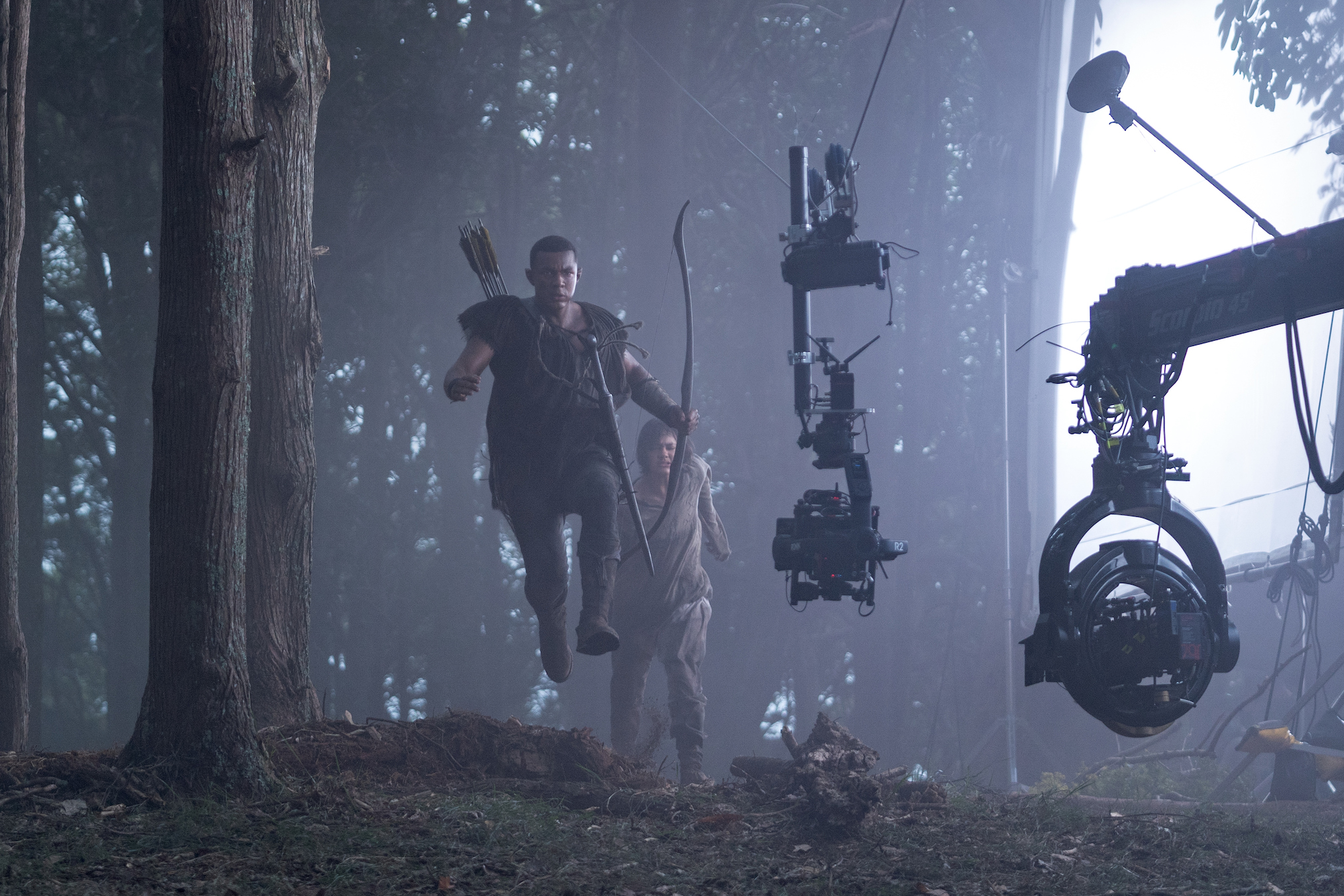
Prime Video
Going off of that, one of the key traits about Arondir that I love is his tenderness. Why did you want to highlight that?
Córdova: We have these archetypes of what we’re seen as. For me, I can’t play an Elf because I don’t know an Elf. But what am I seen as, in terms of masculinity, being a man of color, aggression, all these things that are often what is expected, what is seen, and what is represented, and tenderness is not one of them. Softness is not one of them. Tenderness brings a lot of conflict for people, especially men, so that’s a huge dramatic point. How do I emote from that masculine perspective or that stoic perspective? How do I feel through it, represent it, be vulnerable, but on top of that, how do I emote and be tender as an Elf? So it was very important for me to show the conflict, because that’s what it was. The conflict that made him go back and forth from feeling, from showing, from loving.
Clark: And I loved that he was a grower. He cared for the land. He is gentle and cares for things.
Córdova: Yeah. But we were given these responsibilities. Wherever you are in the landscape of especially Elves, you have an assignment, and mine is lower hierarchy. I’m a just a frontline soldier. Doesn’t matter what else I wanted to do. That’s what I have to do. So you see what’s behind, what is his story.
Galadriel and Arondir both reject their orders in favor of following their instincts. Do you think that makes them prime examples of elves, or are they outliers?
Clark: The elves are kind of mental in The Silmarillion. They did really crazy stuff and caused some damage. I think Galadriel is definitely an outlier at this point, because I think she’s very disconnected from nature and community in the world. She’s become a bit individualistic with her grief, which I think is kind of “un-elfy” and very far from where she’ll end up.
Córdova: I think Arondir’s an outlier in the sense of his sensibility, his emotional openness, his curiosity towards humans, his willingness to forgive them, his willingness to see their strengths. The humaneness that he’s exploring is completely radical and bonkers and brings a lot of strife and perhaps is the one thing that dooms a lot of his people. There’s a big question mark: Is it his fault that they got caught?
I think they’re both outliers, because you’re also being led, not so much by duty, which is a big elven thing, but you’re led a lot by grief. It’s these emotions that they’re led with that are not super across the board in our culture. We’re a bit more sensible in a certain way.
Clark: I feel that when they finally meet in Episode 6, there is a connection between them, which makes sense that they’re both slightly off center.
Córdova: My full fan-girling moment.
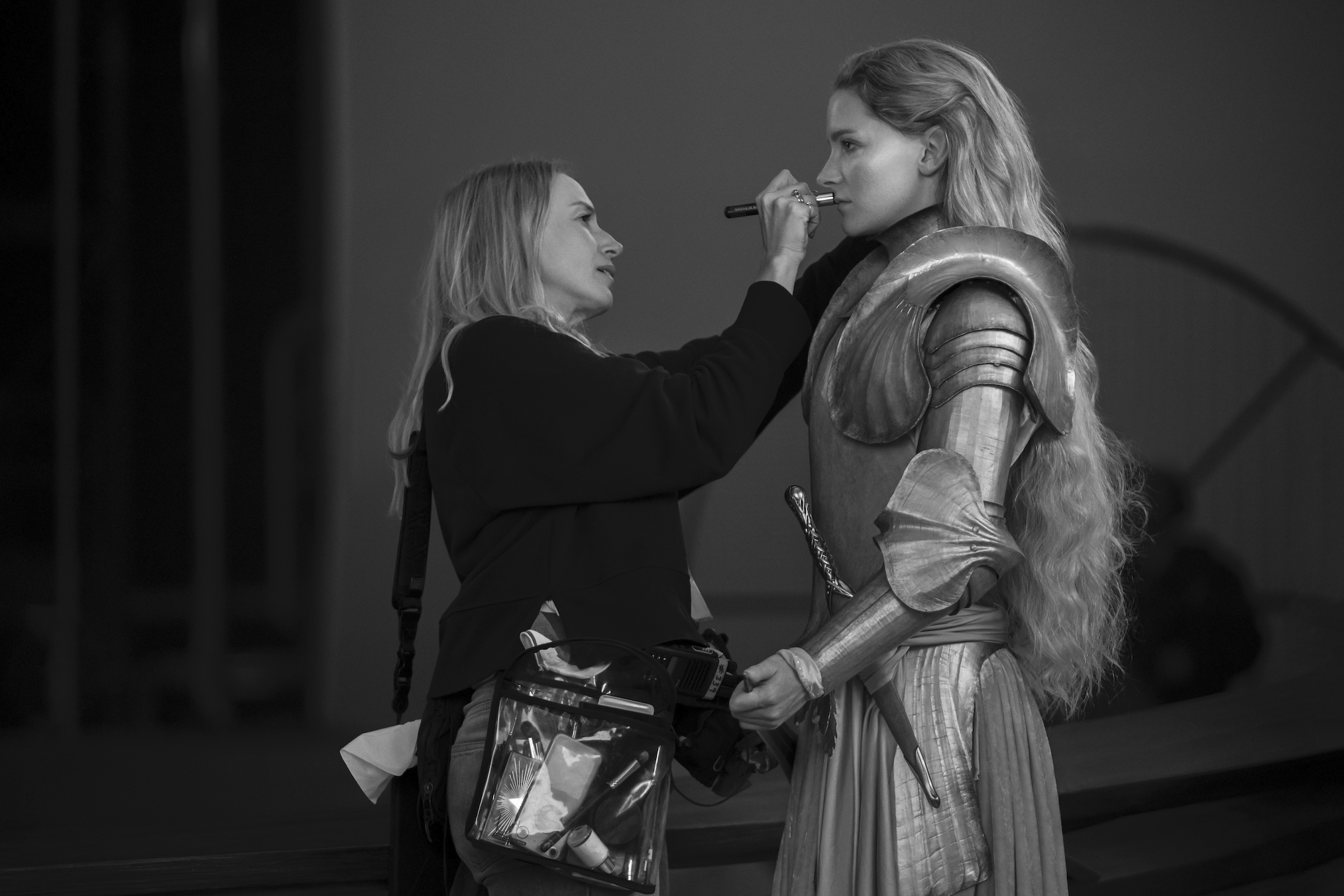
Prime Video
We see Galadriel in an entirely new way in this series. What are the key traits you wanted to bring out in your Galadriel that differentiated her from the previous version?
Clark: I’ve always loved fantasy, because I’ve always loved that these magical creatures represent something slightly strange and slightly different and outlier-ish. I love that the elves have a gender fluidity to them, a kind of very different relationship with gender. I wanted to really shed lots of the people-pleasing, palatableness of being a human woman that I just didn’t think she would have. Though she is calm and somewhat at peace and rejects the ring in The Lord of the Rings, she is still kind of feared. She’s called a witch, and she’s slightly frightening.
I liked the idea that she was, that all the elves are unnerving and nobody can completely trust them because they’re magical and different and powerful and frightening. It was exploring letting go of the pleasantries that I, as a mere mortal in this world, kind of put on myself, and that was also very liberating.
Arondir is one of the new characters made for the show. Were there characters in the books you turned to as a kind of blueprint for building your character beyond what was in the scripts?
Córdova: There is the general information that I could gather and all that I could read, but I also leaned into the opportunity of creating something new and allowing myself to not try to play “elvenness,” The Silmarillion. I think you can run into a very big dead end or trap if you try to play that, because I don’t know what it is to be eternal. It’s something that you cannot grasp. It’s too vast, so instead, I went into what was the smallest thing that I could reference like a wound, an obstacle, curiosity, and also looked at references from real life.
What is the most elven example that I can find? I leaned into my own ancestry. I went into the indigenous cultures, and in my research, I found these portraits of Native American chiefs that have these stares like a thousand-year-old stare that is really elven. They’re connected with something else. They’re connected with the Earth, they’re connected with spirituality, with time, with space. So I began my process with that kind of preparation, and I ran with it. To me, he is a being that has very, very familiar questions and familiar obstacles.
Then you put the structure on it that he’s announced and whatnot. But from the start, he’s just confused and curious and suddenly in love, and it’s the first time. I just remember when I first fell in love, and I was so surprised by it but at the same time just overwhelmed. And I think you see that childish aspect of him just kind of observing her with the corner of his eye.
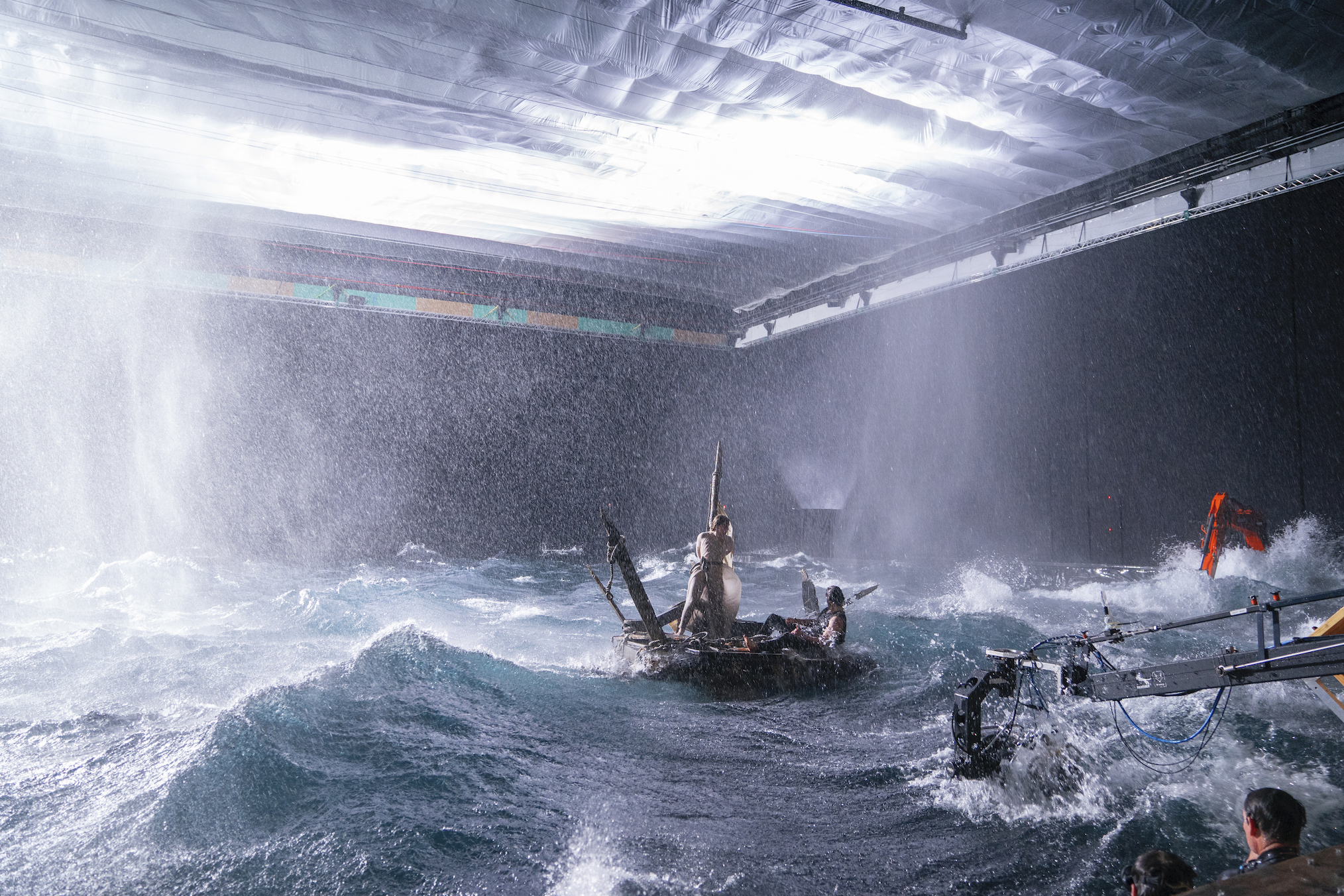
Prime Video
What are you proudest of about your performances from this season?
Clark: I’m really proud of the relationship that me and Charlie created between Halbrand and Galadriel and its ultimate destruction in Episode 8. It was really nice when people started to see it, that people thought that we had great chemistry. Really, that came from feeling just so completely safe with Charlie. He’s so kind, he’s so professional, he’s so open that I feel we could explore loads without fear together. And to see that kind of pay off and to see people be excited by it, I love that people like them and write fanfic about them and stuff like that.
Córdova: I’m very proud of, of my performance as a whole. When I came to the project, I was very clear that I wanted to work deeply hand in hand with the character, but also what I knew it was going to be in terms of representation, the historic aspect of it, and the repercussions that I would have, but also the struggle that I experienced since it was first revealed I was going to be a cast member. People didn’t even know that I was going to be an Elf, but there was so much backlash.
I have to talk about this consistently because I did not get the opportunity to just play Arondir. Through shooting, I was also dealing with this external backlash, racism, and death threats, and all of that. I fought for this role tooth and nail in the process. I had three rejections of the role, seven months of auditioning, plus a lifetime of wanting to be an Elf and receiving so much discouragement. It was laughable that I wanted to be an Elf. It was something that, since I first saw the movies, was like, “You can’t be an Elf like, you don’t look like them. There’s no Elf like you.” So this is 21 years in the making for me to play this role.
I am very committed to reframing the social wiring of what it is for people like myself, what it conjures in people’s minds. We are consistently seen overcoming or are in oppression and violence and stuff like that. And what I wanted to show was vulnerability, strength, elegance, heroism, epic-ness, but at the center of that, curiosity and tenderness. So that’s what I am very proud of, because I think I was able to bring forward a completely different example of what this character could have been. He could’ve been toxic and whatever. But my goal was that, and I’m very proud to say that if I didn’t achieve it, I got very close.
The Lord of the Rings: The Rings of Power, Season 1 Available Now, Prime Video
































































